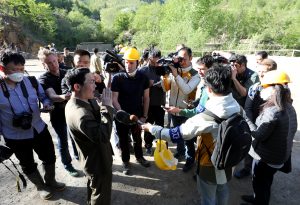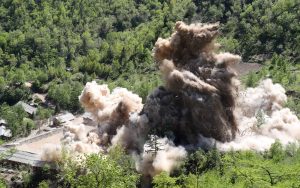
By Roberta Rampton and Christine Kim
WASHINGTON/SEOUL (Reuters) – U.S. President Donald Trump dangled the possibility on Friday that a June 12 summit with North Korea’s leader Kim Jong Un, could still take place, just a day after he canceled the meeting citing Pyongyang’s “open hostility.”
Trump indicated the summit could be salvaged after welcoming a conciliatory statement from North Korea saying it remained open to talks.
“It was a very nice statement they put out,” Trump said as he left the White House to deliver a commencement address at the U.S. Naval Academy. “We’ll see what happens – it could even be the 12th.
“We’re talking to them now. They very much want to do it. We’d like to do it.”

An official form North Korea’s Nuclear Weapons Institute talks to reporters during the dismantlement process in Punggye-ri, North Hamgyong Province, North Korea May 24, 2018. Picture taken May 24, 2018 News1/Pool via REUTERS
Earlier on Twitter, Trump had noted “very good news to receive the warm and productive statement from North Korea.”
After decades of tension on the Korean Peninsula and antagonism with the United States over Pyongyang’s nuclear weapons program, Kim and Trump agreed to what would be the first meeting between a serving U.S. president and a North Korean leader. The plan followed months of war threats and insults traded between the leaders, as well as advances in North Korean missiles capable of reaching the United States.
Trump scrapped the meeting on Thursday after repeated threats by North Korea to pull out of the summit in Singapore over what it saw as confrontational remarks by U.S. officials. Trump cited North Korean hostility in canceling the summit.
In Pyongyang, North Korean Vice Foreign Minister Kim Kye Gwan said North Korea’s criticisms of certain U.S. officials had been a reaction to American rhetoric and that the current antagonism showed “the urgent necessity” for the summit.
“His sudden and unilateral announcement to cancel the summit is something unexpected to us and we cannot but feel great regret for it,” Kim Kye Gwan said of Trump in a statement on state media.
He said North Korea remained open to resolving issues with Washington “regardless of ways, at any time.”
Trump’s latest about-face sent officials scrambling in Washington. U.S. Defense Secretary Jim Mattis told reporters diplomats were “still at work” and said Trump had just sent a note out on the summit, which could be back on “if our diplomats can pull it off.”
North Korea had sharply criticized suggestions by Trump’s national security adviser, John Bolton, and Vice President Mike Pence that it could share the fate of Libya if it did not swiftly surrender its nuclear arsenal. Libyan leader Muammar Gaddafi was deposed and killed by NATO-backed militants after halting his nascent nuclear program.
Kim Kye Gwan said North Korea appreciated Trump having made the bold decision to work toward a summit.
“We even inwardly hoped that what is called ‘Trump formula’ would help clear both sides of their worries and comply with the requirements of our side and would be a wise way of substantial effect for settling the issue,” he said.
Trump had initially sought to placate North Korea, saying he was not pursuing the “Libya model” in getting the North to abandon its nuclear weapons program. White House press secretary Sarah Huckabee Sanders said: “This is the President Trump model. He’s going to run this the way he sees fit.”

A command post of Punggye-ri nuclear test ground is blown up during the dismantlement process in Punggye-ri, North Hamgyong Province, North Korea May 24, 2018. Picture taken May 24, 2018. News1/Pool via REUTERS
SALVAGE THE SUMMIT
U.S. regional allies Japan and South Korea, as well as North Korea’s main ally, China, urged the two countries to salvage the summit on Friday.
At an economic forum in St. Petersburg, Chinese Vice President Wang Qishan said such a summit was necessary to ensure security on the Korean peninsula, which touched on China’s core interests.
Japanese Prime Minister Shinzo Abe, at the same forum, regretted the cancellation of the summit and said the world should keep doing its bit to make it happen.
In Seoul, South Korean President Moon Jae-in, who had urged Trump at a White House meeting on Tuesday not to let a rare opportunity slip away, said on Thursday he was “perplexed” by the cancellation.
South Korea also would continue efforts to improve ties with the North, the presidential office said after Moon’s top security advisers met for the second time on Friday.
Some analysts worried that canceling the summit could prompt a resumption in hostilities, including renewed shorter-range missile tests or stepped-up cyber attacks by Pyongyang and increased sanctions or deployment of new military assets by Washington.
In his letter, Trump warned Kim of the United States’ greater nuclear might, reminiscent of the president’s tweet last year asserting that he had a “much bigger” nuclear button than Kim.
While the Trump administration had insisted on North Korea’s complete, verifiable and irreversible dismantling of its nuclear program, Pyongyang had always couched its language in terms of denuclearization of the Korean peninsula.
It has said in previous, failed talks that it could consider giving up its arsenal if the United States provided security guarantees by removing its troops from South Korea and withdrawing its so-called nuclear umbrella of deterrence from South Korea and Japan.
Before Trump scrapped the meeting on Thursday, North Korea said it had completely dismantled its Punggye-ri nuclear test facility “to ensure the transparency of discontinuance” of nuclear testing.
(Additional reporting by Doina Chiacu, Idrees Ali, David Brunnstrom and Matt Spetalnick in WASHINGTON, Christian Lowe, Denis Pinchuk and Katya Golubkova in St Petersburg; Writing by So Young Kim and Doina Chiacu; Editing by Bill Trott)